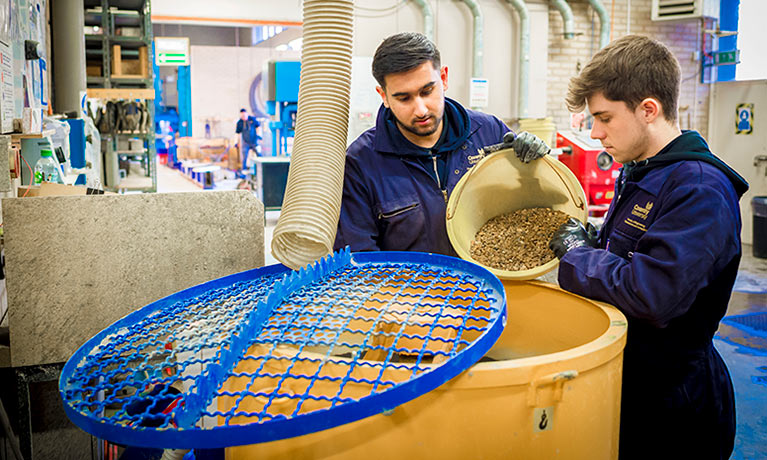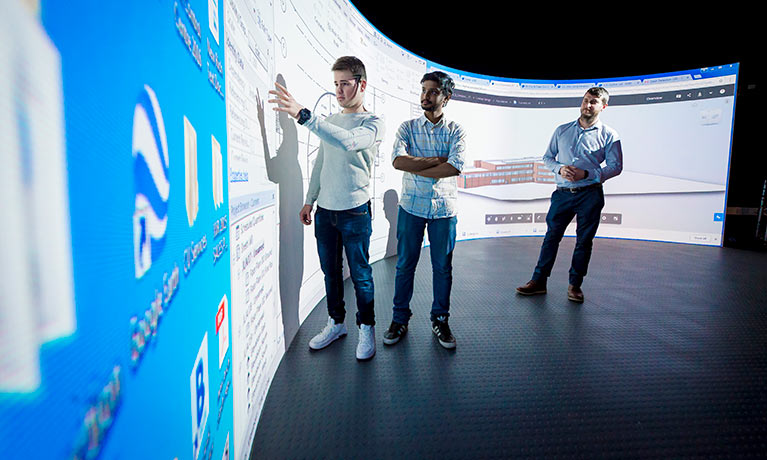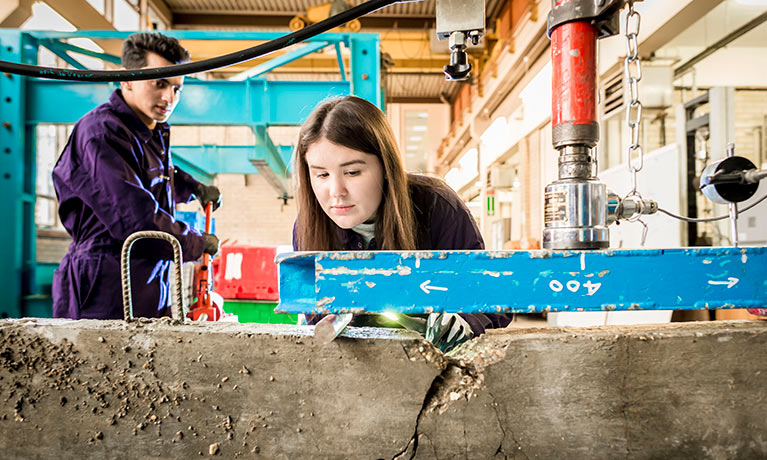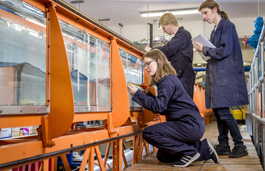Search
Civil Engineering MEng/BEng (Hons)
Study level: Undergraduate
This Civil Engineering course is aimed toward students aspiring to become professionally qualified engineers, for those who wish to study Civil Engineering with an emphasis on practice and construction.
Course option
Year of entry
Location
Coventry University (Coventry)
Study mode
Full-time
Sandwich
Duration
BEng:3 years full-time4 years sandwich
MEng:4 years full-time5 years sandwich
UCAS codes
H200 / H202
Start date
September 2024
January 2025
Course overview
This course aims to combine the development of technical, practical and managerial skills necessary to analyse, design and manage solutions for innovative and complex engineering problems as a basis for future leadership in the civil engineering profession.
- You will have opportunities to draw on real-life case studies provided by companies such as Arcadis, CGL, Crossrail and Galliford Try.
- You will have access to industry-standard software, widely used by design and consulting engineers.
- You will be presented with opportunities to apply for industrial placements2 at companies which have previously included: Atkins, Balfour Beatty, Interserve, Morgan Sindall, Mott MacDonald, Severn Trent Water and Warwickshire County Council.
Rated Gold Overall
Teaching Excellence Framework (TEF) 20235 QS Stars for Teaching and Facilities
QS Stars University RatingsTop 5 Student City in England (Coventry)
QS Best Student Cities Index 2025Why you should study this course
- Practical activities and application of knowledge through project-led learning in design project modules.
- Exercises in the Simulation Centre (a full-scale simulated construction environment) to experience real challenges of construction management in a controlled environment and to develop professional and leadership skills4.
- International field course to enhance your global awareness and experiences2.
- Several optional modules allow you to tailor your course to your specific interests. You can select from Computational Methods in Civil Engineering, Engineering Hydrology, Transport Infrastructure, Strategic Construction Project Management and Structural Design.
- Work alongside students from other Construction and Environment related courses such as Surveying, Architectural Technology and Geography to widen your knowledge and exposure to other subject areas and professions.
Accreditation and professional recognition
Accreditation for the degree is being renewed as we are making some changes to our modules. This exciting new course is subject to approval from the Joint Board of Moderators (JBM)1.
Partnerships
Coventry University has signed an academic-professional partnership agreement with The Institute of Highway Engineers (IHE) as part of IHE’s Academic-Professional Partnership Scheme. The purpose of the scheme is for the IHE to provide support, advice and guidance on the membership of a professional Institute. The IHE can also provide advice and assistance on the routes toward professional registration for students studying civil engineering with a particular interest in highways and transportation.
What you'll study
We regularly review our course content, to make it relevant and current for the benefit of our students. For these reasons, course modules may be updated.
How you'll learn
The highly practical nature of the course should enable you to work with staff and students on real-world problems from industry, commerce and research groups2.
This means that while we cover the technical content of your degree, these projects aim to develop the professional skills required including (but not limited to):
- Problem analysis and design;
- Project, task and time management;
- Risk assessment;
- Teamwork and leadership
- Technical report and engineering assessment;
- Troubleshooting
Teaching contact hours
We understand that everyone learns differently, so each of our courses will consist of structured teaching sessions, which can include:
- On campus lectures, seminars and workshops
- Group work
- Self-directed learning
- Work placement opportunities2.
The number of contact hours may vary from semester to semester, however, on average, it is likely to be around 14-15 contact hours per week in the first and second year dropping to around 11 contact hours per week in the final year as you become a more independent learner.
In addition, you will be expected to undertake approximately 30-35 hours of self-directed study per week depending on the demands of individual modules. This self-directed learning allows you to use your research skills, consolidate your knowledge or undertake collaborative group work.
As an innovative and enterprising institution, the university may seek to utilise emerging technologies within the student experience. For all courses (whether on-campus, blended, or distance learning), the university may deliver certain contact hours and assessments via online technologies and methods.
Since COVID-19, we have delivered our courses in a variety of forms, in line with public authority guidance, decisions, or orders and we will continue to adapt our delivery as appropriate. Whether on campus or online, our key priority is staff and student safety.
Assessment
This course will be assessed using a variety of methods which will vary depending upon the module.
Assessment methods include:
- Formal examinations
- Phase tests
- Essays
- Group work
- Presentations
- Reports
- Projects
- Coursework
- Exams
- Individual assignments
- Laboratories
The Coventry University Group assessment strategy ensures that our courses are fairly assessed and allows us to monitor student progression towards achieving the intended learning outcomes.
International experience opportunities
There is a mandatory international field trip during your studies that gives the students a global experience where they need to fulfil a design brief while taking account of the local climate, physical terrain, resources available, social and cultural environment.
Students may also seek to undertake a relevant professional/international placement year between Years 2 and 3 of an undergraduate degree. This opportunity is encouraged to provide students with the depth of experience that such an opportunity affords. Assistance with acquiring a relevant placement is offered by our Talent Team4.
Entry requirements
Typical offer for 2024/25 entry.
Not got the required grades? We offer this degree with an integrated foundation year.
Fees and funding
2024/25 tuition fees.
| Student | Full-time | Part-time |
|---|---|---|
| UK, Ireland*, Channel Islands or Isle of Man | £9,250 per year | Not available |
| EU | £9,250 per year with EU Support Bursary** £19,850 per year without EU Support Bursary** |
Not available |
| International | £19,850 per year | Not available |
If you choose to do a work placement2, you should consider travel and living costs to cover this. There is also a tuition fee3 of £1,250 that will cover your academic support throughout your placement year.
For advice and guidance on tuition fees and student loans visit our Undergraduate Finance page and see The University’s Tuition Fee and Refund Terms and Conditions.
We offer a range of International scholarships to students all over the world. For more information, visit our International Scholarships page.
Tuition fees cover the cost of your teaching, assessments, facilities and support services. There may be additional costs not covered by this fee such as accommodation and living costs, recommended reading books, stationery, printing and re-assessments should you need them. Find out what's included in your tuition costs.
The following are additional costs not included in the tuition fees:
- Optional international field trips: £400+ per trip.
- Any costs associated with securing, attending or completing a placement (whether in the UK or abroad).
Other additional costs
- Mandatory international field trips: Typically between £200 and £400 per trip
*Irish student fees
The rights of Irish residents to study in the UK are preserved under the Common Travel Area arrangement. If you are an Irish student and meet the residency criteria, you can study in England, pay the same level of tuition fees as English students and utilise the Tuition Fee Loan.
**EU Support Bursary
Following the UK's exit from the European Union, we are offering financial support to all eligible EU students who wish to study an undergraduate or a postgraduate degree with us full-time. This bursary will be used to offset the cost of your tuition fees to bring them in line with that of UK students. Students studying a degree with a foundation year with us are not eligible for the bursary.
Facilities
Our £50m Engineering and Computing Building and new £25m Beatrice Shilling Building are designed to support hands-on learning. The Sir John Laing Building also houses a variety of industry-standard labs and equipment.4

Materials Laboratory
Includes industrial standard timber and steel workshops, a concrete mixing area with 3 pan mixers, programmable environmental chambers, a range of ovens and curing tanks and various materials testing apparatus.

Simulation Centre
Our interactive training centre is used to create a ‘virtual’ construction site with fully-equipped site cabins and observation deck. Students undertake role play exercises to help prepare them for situations in the workplace.

Structures Laboratory
Includes eight test frames, two of which are fully programmable ‘top of the range’ Instron universal test machines. It also includes a strong floor area with associated framing and ancillary measurement devices.
Careers and opportunities
Graduates from these courses should be well-suited to working in a range of Civil Engineering consultancies, contractors or client organisations and they will have a sound base to ultimately become Chartered Civil Engineers.
The aims of the BEng course are that graduates will have the ability to:
- Work collaboratively with other construction disciplines in the development of engineering solutions through critical evaluation and reflection, and effectively communicate proposals using a variety of media to suit different audiences;
- Demonstrate awareness of the conflicting demands of clients, stakeholders and other construction professionals in the planning and execution of appropriate inter-disciplinary design solutions;
- Recognise and respond to social, environmental, economic, security and ethical considerations in an international context;
- Undertake interdisciplinary teamwork in a respectful and inclusive manner and effective self-management and development;
- Conduct independent thinking, critical reflection, and individual initiative as the basis for research, innovation and lifelong professional learning to enhance their skills and knowledge throughout their careers;
- Identify, analyse and solve engineering problems and apply their knowledge, technical and practical skills creatively and effectively as required for a successful career as a Chartered Civil Engineer;
Additionally, the aims for the MEng course are that graduates will have the ability to:
- Adopt key roles within multi-disciplinary and multi-cultural Civil Engineering design or construction teams, contributing leadership, analytical, creative, innovative and original thought and discipline specific (e.g. structures, highways, geotechnics) expertise.
- Demonstrate a holistic understanding of the physical and social environment globally and how Civil Engineers can contribute to sustainable development and quality of life.
- Critically evaluate the performance of others, assist them to develop and support their work, in addition to taking full responsibility for their own personal and professional development.
Where our graduates work
Coventry University has a long-established reputation for the teaching of Civil Engineering and currently has excellent links with employers like Arcadis, Arup, Atkins, Balfour Beatty, BAM, Buro Happold, CGL, CPUK, Donaldson Associates, Galliford Try, Geotechnics Ltd, Interserve, Kier, Laing O’Rourke, Morgan Sindall, Mott MacDonald, Severn Trent Water, Warwickshire County Council and Willmott Dixon, many of whom provide direct input into course development as members of our Industrial Advisory Board.
Further Study
You may be entitled to an alumni discount on your fees if you decide to extend your time with us by progressing from undergraduate to postgraduate study.
Graduate Immigration Route visa
Based on current information from the UK Government, international students whose study extends beyond summer 2021 may be eligible for a visa under the UK Government’s Graduate Immigration Route, which will enable students to stay and work, or look for work, in the UK at any skill level for up to two (2) years. Check the most up to date guidance available to check your eligibility and any updates from the UK Government before making an application or enrolment decision.
How to apply
You may also like

Civil Engineering BSc (Hons)





